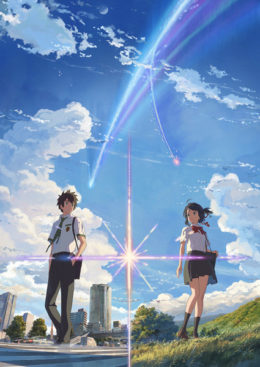

Your Name (Kimi no Na wa) is a new film written and directed by Makoto Shinkai. It’s now showing in American movie theaters. Even better, it’s being shown in both dubbed and subtitled versions. I strongly recommend the subtitled version. But act fast–it’s not going to be in the theaters very long.
The animation quality is quite good and the writing is top-notch, probably the best thing that Shinkai has ever done. The plot is intricate but it hangs together very well. Unlike many of Shinkai’s stories it has a fully satisfactory ending.
I’m not going to say too much about the story to avoid spoilers. It involves two high school students. One is an awkward boy living in Tokyo who hasn’t given much thought to what he wants out of life. The other is a frustrated girl in a rural town in the mountains. She’s embarrassed by her duties as a miko at the local shrine, and wishes she lived in an exciting big city.
For some reason they start waking up in each other’s bodies on a regular basis. Afterwards the experience seems like a dimly remembered dream, but their friends tell them that they were acting strangely. Once they start leaving notes to each other they quickly figure out what is happening, but don’t know what to do about it.
A story like this depends a lot on the skill of the voice actors, which is one reason I strongly recommend the subtitled version. I’m particularly impressed by Ryunosuke Kamiki’s ability to portray a girl trying hard to use male speech but getting the subtle details like the intonation wrong. The effect should be noticeable even if you don’t know any Japanese.
This movie deals with some of the same themes that appeared in Makoto Shinkai’s earlier works such as 5 Centimeters Per Second. (But the characters in Your Name have a lot more gumption than those in 5cm/sec which makes a big difference.)
Your Name also gets into more speculative territory, asking about the nature of dreams and the possible significance of old Shinto rituals.
The Japanese title, Kimi no Na wa would be better translated as “What’s your name?” (This should be pretty obvious if you see the movie.) Warning: this is a very informal phrasing that in general would only be suitable for asking children. In almost every other case the more formal “Onamae wa? would be much more appropriate. (Pronounce each vowel separately: “O-na-ma-eh-wa?”)

